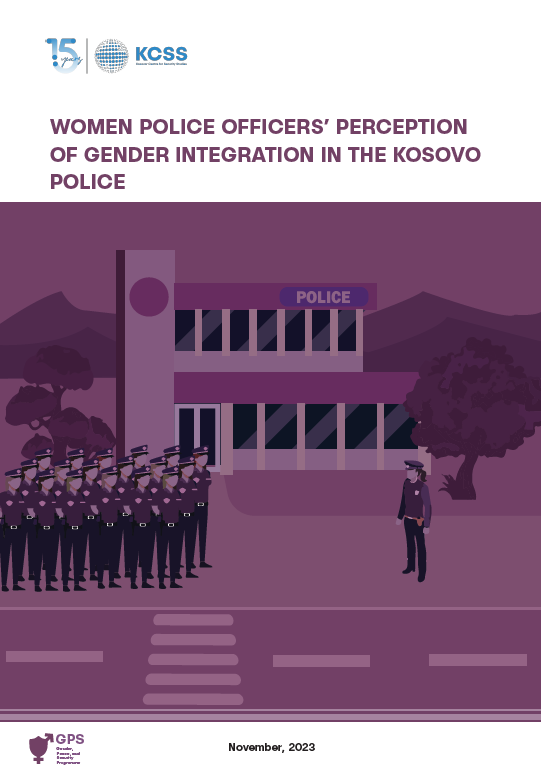2/11/2023

Kosovar Center for Security Studies
Kosovo Foundation for Civil Society (KCSF) program ‘EJA Kosovo
Adelina Hasani
Kosovo has made significant strides in improving women’s political representation by implementing gender quotas to enhance the presence of women in its all state institutions. The enactment of Kosovo’s Law on Gender Equality in May 2015 marked a crucial milestone in strengthening the nation’s legal framework for promoting gender equality.
However, despite progress, Kosovo still faces numerous gender equality challenges, particularly in the realms of women’s leadership positions, equal political participation, and ending violence against women. Traditional gender role mentalities, discrimination, and stereotyping have presented significant barriers to women’s involvement in decision-making at all levels, including within the security sector. Despite some notable improvements, the journey towards increased representation of women in the Kosovo Police remains a work in progress.
Nevertheless, in many countries, likewise in Kosovo, security sector policies and programming have failed to analyze women’s security needs and priorities adequately and involve women and men equally by integrating their gender perspectives. In such cases, security institutions are often rife with equality gaps and may be unable to provide security for all community members. Efforts aimed at integrating a gender perspective into policies and practices of the security sector have predominantly focused on women’s representation rather than on their specific needs.
The data conducted shows that Kosovo’s policies have demonstrated significant efforts to enhance the gender perspective within the Kosovo Police. However, challenges persist, stemming from factors such as the limited participation of women in managerial and decision-making roles, traditional male dominance, patriarchal mindsets, and the need for comprehensive integration of gender perspectives into all laws and regulations governing the Kosovo Police.
This report highlights and analyzes women’s critical challenges in the Kosovo Police from the perspective of women police officers. Women’s issues are often not treated as a priority and do not receive the necessary attention. Through this report, we will examine the working environment for women in the Kosovo Police, the primary challenges they encounter, unaddressed issues that have not been taken seriously, policies that should promote gender diversity, and the impact and contribution of women within the the Kosovo Police.
The report employs a qualitative methodology and relies on semi-structured interviews with experienced and high-ranking women in the Kosovo Police. These interviews have focused on gaining insights into the working environment, gender sensitivity within security institutions, and the primary challenges faced by women in the sector. Additionally, we have conducted seven focus groups with women in the Kosovo Police who do not hold high-ranking positions. The aim is to analyze and comprehend the dynamics and factors that hinder women’s advancement to higher ranks within the Kosovo Police. These focus groups were organized in Prizren, Prishtina, Mitrovica, Gjilan, Gjakova, Ferizaj, and Peje. Through these focus groups, we have collected comprehensive information about the working environment and gender integration within the Kosovo Police.
The development and publication of this document has been supported by the Kosovo Foundation for Civil Society (KCSF) program ‘EJA Kosovo’, co-financed by the Swiss Agency for Development and Cooperation (SDC), Sweden, and the Government of the Grand Duchy of Luxembourg. The content of this document is the responsibility of Kosovar Centre for Security Studies (KCSS) and does not necessarily represent the views of KCSF, SDC, Sweden or Luxembourg.